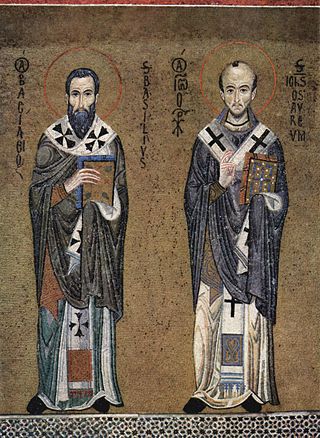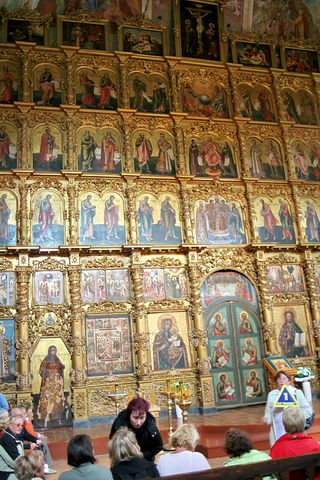Related Research Articles

Divine Liturgy or Holy Liturgy is the usual name used in most Eastern Christian rites for the Eucharistic service.

The Byzantine Rite, also known as the Greek Rite or the Rite of Constantinople, is a liturgical rite that is identified with the wide range of cultural, devotional, and canonical practices that developed in the Eastern Christian church of Constantinople.
Ivan Moody was a British composer and musicologist.
The Sanctus is a hymn in Christian liturgy. It may also be called the epinikios hymnos when referring to the Greek rendition and parts of it are sometimes called "Benedictus". Tersanctus is another, rarer name for the Sanctus. The same name is sometimes used for the Trisagion.
The Apolytikion or Dismissal Hymn is a troparion said or sung at Orthodox Christian worship services. The apolytikion summarizes the feast being celebrated that day. It is chanted at Vespers, Matins and the Divine Liturgy; and it is read at each of the Little Hours. The name derives from the fact that it is chanted for the first time before the dismissal of the first service of the liturgical day, Vespers, the liturgical day beginning at sunset in the Orthodox Church.

Psalm 103 is the 103rd psalm of the Book of Psalms, beginning in English in the King James Version: "Bless the LORD, O my soul". The Book of Psalms is part of the third section of the Hebrew Bible, and a book of the Christian Old Testament. In Latin, it is known as "Benedic anima mea Domino". The psalm is a hymn psalm.
Liturgy of St John Chrysostom, Op. 31, is a 1910 musical work by Sergei Rachmaninoff, one of his two major unaccompanied choral works. The Divine Liturgy of St. John Chrysostom is the primary worship service of the Eastern Orthodox Church.
Cappella Romana is a vocal ensemble founded in 1991 in Portland, Oregon. Its name, meaning "Roman Chapel", refers to the medieval Greek concept of the Roman oikoumene, which embraced Rome and Western Europe, as well as the Byzantine Empire of Constantinople and its Slavic commonwealth centered at Moscow. It has become especially known for its exploration of Eastern Orthodox vocal music. It has collaborated with notable museum exhibitions at the Metropolitan Museum of Art in New York and the J. Paul Getty Museum in Los Angeles. The ensemble's 2002 performance of Ivan Moody's Passion and Resurrection was acclaimed by Los Angeles Times music critic Chris Pasles as "sung gorgeously" and "like jeweled light flooding the space".
The Liturgy of Saint Basil or, more formally, the Divine Liturgy of Saint Basil the Great, is a term for several Eastern Christian celebrations of the Divine Liturgy (Eucharist), or at least several anaphoras, which are named after Basil of Caesarea. Two of these liturgies are in common use today: the one used in the Byzantine Rite ten times a year, and the one ordinarily used by the Coptic Church.
Roman Hurko is a New York based composer who specializes in Byzantine Rite Music.

Maximilian Osseyevich Steinberg was a Russian composer of classical music.
Eastern Orthodox worship in this article is distinguished from Eastern Orthodox prayer in that 'worship' refers to the activity of the Christian Church as a body offering up prayers to God while 'prayer' refers to the individual devotional traditions of the Orthodox.
The Liturgy of Saint John Chrysostom is the most celebrated divine liturgy in the Byzantine Rite. It is named after its core part, the anaphora attributed to Saint John Chrysostom, Archbishop of Constantinople in the 5th century.

Mark Bailey is an American conductor and baroque violist. He is the founder and artistic director of the American Baroque Orchestra. Bailey specializes in Slavic music of the 17th and 18th centuries, in addition to baroque, classical, and romantic repertoire, and was the former music director of the Yale Russian Chorus. Bailey frequently guest conducts ensembles such as the Edmonton Symphony Orchestra, Cappella Romana, The Portland Baroque Orchestra, and Pro Coro Canada. He often gives presentations on Slavic baroque music and historical performance practice, and has been a principal guest speaker for the Great Performers series, the Mostly Mozart Festival at Lincoln Center in New York City, the 2016 Musicking Conference at the University of Oregon, and the Indiana University International Performance Practice Conference.
The Liturgy of St. John Chrysostom is an a cappella choral composition by Pyotr Ilyich Tchaikovsky, his Op. 41, composed in 1878. It consists of settings of texts taken from the Divine Liturgy of St. John Chrysostom, the most celebrated of the eucharistic services of the Eastern Orthodox Church. Tchaikovsky's setting constitutes the first "unified musical cycle" of the liturgy.
The Divine Liturgy of St. John Chrysostom is a work by the prominent Serbian composer Stevan Stojanović Mokranjac (1856–1914), composed in 1895. It is one of the most famous and most popular compositions of the Divine Liturgy in Serbian art and is officially recognized as part of the service in the Serbian Orthodox Church.

Romuald Twardowski was a Polish composer, pianist, organist and academic teacher who studied in Vilnius, Warsaw and Paris. In a style described as "developed neoclassicism", he composed operas, ballets, instrumental music and vocal works, especially sacred music for both Catholic use and the Orthodox Church. He achieved international prizes for his compositions, and many works were recorded in anthologies, including the Violin Concerto, chamber music, and sacred and secular choral music such as the Liturgy of St. John Chrysostom. He was professor at the State Academy of Music in Warsaw from 1972 to 2008.
The Liturgy of St. John Chrysostom is the musical setting of the Divine Liturgy of St. John Chrysostom by Mykola Leontovych. Consistent with Orthodox tradition, in which service is sung exclusively a cappella, the piece is set for unaccompanied choir and soloist. It was first performed in the Mykolaiv Cathedral at the Kyiv Pechersk Lavra on May 22, 1919, with Leontovych himself conducting.
The All-Night Vigil for choir, Op. 52, is an a cappella choral composition by Pyotr Ilyich Tchaikovsky, written from 1881 to 1882. It consists of settings of texts taken from the Russian Orthodox all-night vigil ceremony.
Alexander Levine, is a Russian-born British composer. He writes choral, chamber and orchestral music, publishing through Edition Peters.
References
- ↑ "Music Composition". www.nku.edu. Retrieved 3 May 2019.
- ↑ "The Psalm 103 Project". 9 November 2013. Retrieved 3 May 2019.
- ↑ "Heaven and Earth: A Song of Creation" . Retrieved 3 May 2019.
- ↑ "Heaven and Earth: A Song of Creation" . Retrieved 3 April 2020.
- ↑ "Now Available – Kurt Sander: The Divine Liturgy of St. John Chrysostom". Reference Recordings. Retrieved 3 May 2019.
- ↑ "Lyrica Classic Entertainment - 30 ноября в Соборной Палате - Мировая премьера Литургии". Lyrica Classic Entertainment. Retrieved 2022-12-02.